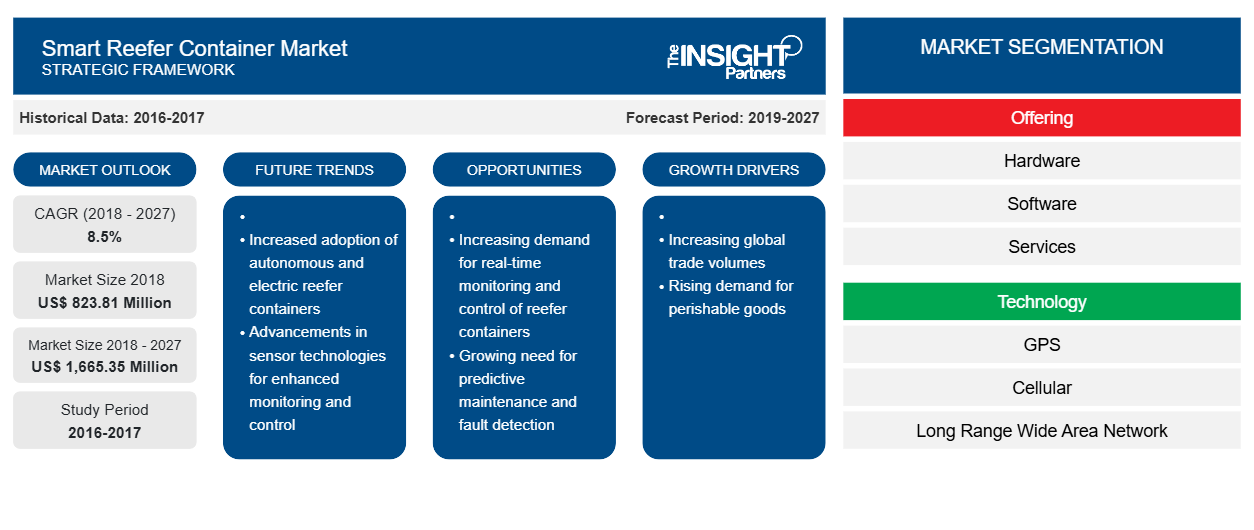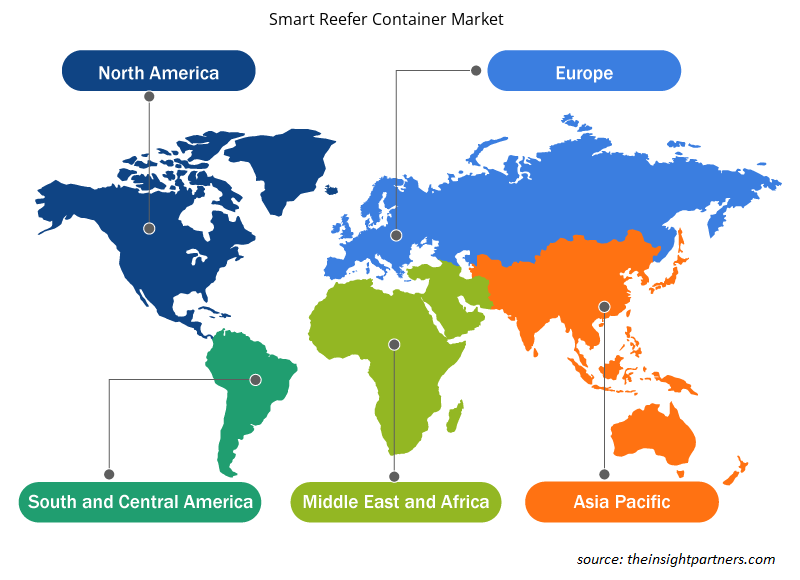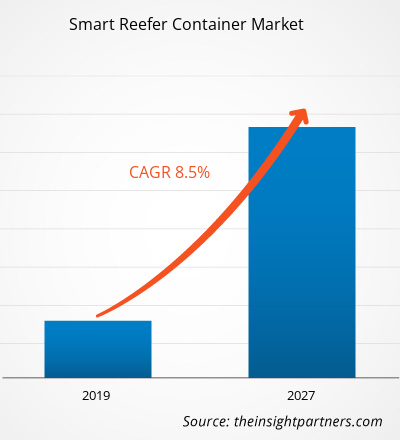The smart reefer container market was valued at US$ 823.81 million in 2018 and is projected to reach US$ 1,665.35 million by 2027; it is expected to grow at a CAGR of 8.5% during 2019–2027.
Reefer containers are refrigerated shipping containers that are utilized for storing or transporting cold or frozen goods, perishable goods which require temperature control. These containers are becoming smart with the integration of telematics devices that offer real time monitoring and tracking, thus facilitating the operators to increase turn time of their containers for further planning and utilization. Smart reefer containers are developed using wide range of sensors such as, temperature, pressure, humidity and others that help in monitoring and controlling environmental conditions. Moreover, the market players are increasingly focusing on adopting advanced technologies such as IoT, artificial intelligence, big data analytics and others to offer high performance solutions for the logistics service providers as well as end-use industries to increase their operation efficiency and provide more visibility in the entire supply chain market.
Smart reefer container market is witnessing significant market initiatives among the industry players to meet the growing demand across the globe. For instance, recently Traxens expanded its presence in in China by opening new office in order to meet requirements of growing Asian supply chain market. Further, in 2019, ZIM Integrated Shipping invested significant amount in developing advanced feature to its existing refrigerated containers, ZIMonitor, by adding star cool units that are manufactured by MCI. In the same year, Traxens and A.P. Moller – Maersk announced that Maersk is aiming to join CMA CGM and MSC Mediterranean Shipping Company as a key shareholder and customer of Traxens. Furthermore, in 2018, ORBCOMM Inc. introduced next-generation solution for remote monitoring and control of refrigerated containers travelling by sea, land, or rail for continuous visibility of operations, enhanced efficiency and reduced costs. All these initiatives are boosting the growth of the market in the current scenario.
Customize This Report To Suit Your Requirement
You will get customization on any report - free of charge - including parts of this report, or country-level analysis, Excel Data pack, as well as avail great offers and discounts for start-ups & universities
Smart Reefer Container Market: Strategic Insights

- Get Top Key Market Trends of this report.This FREE sample will include data analysis, ranging from market trends to estimates and forecasts.
You will get customization on any report - free of charge - including parts of this report, or country-level analysis, Excel Data pack, as well as avail great offers and discounts for start-ups & universities
Smart Reefer Container Market: Strategic Insights

- Get Top Key Market Trends of this report.This FREE sample will include data analysis, ranging from market trends to estimates and forecasts.
Market Insights–Smart Reefer Container Market
Shipment Digitization in Combination with Supportive Programs
Many of the ocean carriers that have already started using smart reefer containers have built alliances with technology companies to digitalize their fleets. In April 2019, the Digital Container Shipping Association (DCSA) was launched to shape the future of container shipping by building standardization, creating the frameworks for effective solutions, as well as exploring opportunities for innovation. The Association is currently supported by several carriers, including Maersk, Hapag Lloyd, CMA CGM, ZIM, and Evergreen Line, among others. Presently, the full Association membership is currently accountable for ~70% of the global container shipping trade.
In June 2019, Indonesian firm PT Trans Kontainer Solusindo partnered with Traxens to deploy its smart reefer containers with tracking telematics technology. Also, in December 2019, Hamburg Süd unveiled Remote Container Management (RCM) technology for reefer container shipments. In June 2019, Hapag-Lloyd announced to deploy Globe Tracker hardware on the company’s fleet of 100,000 reefer containers under a new “Hapag-Lloyd LIVE” offering. Furthermore, in February 2019, Maersk Line announced “Captain Peter,” a virtual assistant intended to simplify data management from its RCM platform. Also, Hamburg Süd installed RCM under a contract with ORBCOMM. Also, ZIM announced to receive delivery of 3,000 smart reefer containers during 2019.
Apart from shipping carriers and technology companies dedicated to the development and use of smart containers, the digitalization of port operations along with the adoption of Industry 4.0 in the container-handling sector is supporting the growth of the smart reefer container market. In 2019, the European Commission launched iTerminals 4.0, a project dedicated to the digitization of port operations as well as the adoption of innovative technologies across European ports. The project is focused on discovering ways to apply industry 4.0 technologies in the container handling sector. Also, We Are Container 42, an innovation, research, as well as serendipity platform initiated by Port of Rotterdam, for stakeholders in the shipping, ports, and associated technologies, have created a single connected container to demonstrate the Internet of Things (IoT) technology for cargo tracking. The factors mentioned above are expected to propel the growth of the smart reefer containers market during the forecast period.
Offering Segment Insights
A refrigerated container or reefer is a container, used for shipping of temperature-sensitive cargo. These containers have one or multiple temperature chambers. The smart reefer container is container which is automated with the help of various technologies. The market is segmented by Offerings, technology, reefer, and industry vertical. By Offering the market is segregated into hardware, software, and services. Further, the hardware segment is segregated into pressure sensors, temperature sensors, humidity sensors, gas sensors, position sensors, and others.
Technology Segment Insights
Refrigerated containers are mostly in-transit time at sea, where managing them poses a series of challenges. Crews are often unable to complete regular checks because of heavy workloads, unfavorable sea and weather conditions and the size of the vessels themselves. The need for end-to-end visibility of the moving supply chain is prompting IoT technology to close the connectivity gap for reefer containers on water. The factors such as need for end-to-end visibility, pre-trip inspections, cargo care, crew safety are increasing the demand for various technologies in the reefer container systems. The various technologies used are GPS, cellular, long range wide area network, Bluetooth low energy (BLE), among others.
Reefer Insights
Reefer containers’ is short for refrigerated containers – one of the six types of shipping containers used in freight forwarding. They look almost identical to regular containers but function as large fridges that can control the temperature of their cargo. This makes them ideal for transporting goods such as pharmaceuticals, fruits, meat, fish and flowers. There are variety of reefers available including, 10GP, 20GP, 40GP, 40HQ, 45HQ.
Industry Vertical Insights
The smart reefer container market is categorized on basis of industry vertical as food & beverages industry, chemical industry, pharmaceutical industry, oil & gas industry, military & defense industry, and others. The food processing industries contributed the maximum revenue shares in 2017 in the region, pertaining to the rapid surging demand for frozen foods, chilled-ready meats, confectioneries, breweries, and liquid milk processing among the North American mass. The US is one of the largest consumers of packaged foods and frozen food followed by developed countries in the Europe. Also, other regions of the world such as Middle East, and the developing economies of APAC exhibit changing patterns in the demand of packaged food and food products. The meat processing as well as dairy industry in these emerging economies has experienced a paradigm shift as a result of the rising demands and increasing individual spends. Owing to the demand from the mass, the demand for smart reefer container in food processing industry is constantly increasing over the years. The demand for smart reefer container is escalating at a decent rate among the chemical & pharmaceutical industry globally, thereby leading the global market to propel. Also, the increasing demand for automated systems in these industries is expected to boost the demand for smart reefer containers.
The market players focus on new product innovations and developments by integrating advanced technologies and features in their products to compete with the competitors.
- 2020: Traxens announced that it would open a representative office in Shenzhen, China – its first office outside of France – to respond to the increasing need for more Asian exposure and local support for its global customers, In line with its international expansion strategy.
- 2019: Nexxiot would equip VTG's entire tank container fleet with IoT sensors. The tank containers would be equipped with the Globehopper sensors developed by the company so that they can be located and monitored worldwide.
- 2019: Globe Tracker International and CakeBoxx Technologies announced their strategic partnership. Under the agreement, the companies would combine service and product offerings to supply the global shipping market with a pre-configured, off-the-shelf secure container/asset tracking solution.
Smart Reefer Container Market Regional Insights
The regional trends and factors influencing the Smart Reefer Container Market throughout the forecast period have been thoroughly explained by the analysts at The Insight Partners. This section also discusses Smart Reefer Container Market segments and geography across North America, Europe, Asia Pacific, Middle East and Africa, and South and Central America.

- Get the Regional Specific Data for Smart Reefer Container Market
Smart Reefer Container Market Report Scope
| Report Attribute | Details |
|---|---|
| Market size in 2018 | US$ 823.81 Million |
| Market Size by 2027 | US$ 1,665.35 Million |
| Global CAGR (2018 - 2027) | 8.5% |
| Historical Data | 2016-2017 |
| Forecast period | 2019-2027 |
| Segments Covered |
By Offering
|
| Regions and Countries Covered | North America
|
| Market leaders and key company profiles |
Smart Reefer Container Market Players Density: Understanding Its Impact on Business Dynamics
The Smart Reefer Container Market is growing rapidly, driven by increasing end-user demand due to factors such as evolving consumer preferences, technological advancements, and greater awareness of the product's benefits. As demand rises, businesses are expanding their offerings, innovating to meet consumer needs, and capitalizing on emerging trends, which further fuels market growth.
Market players density refers to the distribution of firms or companies operating within a particular market or industry. It indicates how many competitors (market players) are present in a given market space relative to its size or total market value.
Major Companies operating in the Smart Reefer Container Market are:
- Arviem AG
- Globe Tracker, ApS
- Hapag-Lloyd AG
- Maven Systems Pvt. Ltd.
- Nexxiot AG
Disclaimer: The companies listed above are not ranked in any particular order.

- Get the Smart Reefer Container Market top key players overview
GLOBAL SMART REEFER CONTAINER MARKET SEGMENTATION
Global Smart Reefer Container Market – By Offerings
- Hardware
- Pressure Sensors
- Temperature Sensors
- Humidity Sensors
- Gas Sensors
- Position Sensors
- Others
- Software
- Service
Global Smart Reefer Container Market – By Technology
- GPS
- Cellular
- Long Range Wide Area Network
- Bluetooth Low Energy (BLE)
- Others
Global Smart Reefer Container Market – By Reefer
- 10GP
- 20GP
- 40GP
- 40HQ
- 45HQ
Global Smart Reefer Container Market – By End-User Industry
- Food & Beverage
- Pharmaceutical
- Oil & Gas
- Chemicals
- Military & Defense
- Others
Global Smart Reefer Container Market - By Geography
North America
- U.S.
- Canada
- Mexico
Europe
- Germany
- France
- Italy
- UK
- Russia
- Rest of Europe
Asia Pacific (APAC)
- Australia
- China
- India
- Japan
- South Korea
- Rest of APAC
Middle East & Africa (MEA)
- South Africa
- UAE
- Saudi Arabia
- Rest of MEA
South America (SAM)
- Brazil
- Argentina
- Rest of SAM
Global Smart Reefer Container Market - Company Profiles
- ORBCOMM Inc.
- Wireless Links Inc.
- Traxens
- Globe Tracker, ApS
- Hapag-Lloyd AG
- Nexxiot AG
- Maven Systems Pvt. Ltd.
- AikSphere Technologies Inc.
- Tracker Systems, Inc.
- Thermo King Corporation
- Arviem AG
- Sealand - A Maersk Company
Frequently Asked Questions
What are market opportunities for Smart Reefer Container?
The increased demand for fresh vegetables, fruits, and other perishable commodities is expected to provide vendors with diversified opportunity in the coming years. Also, the demand for pharmaceuticals is increasing owing to the rising demand for better and improved quality medicines and vaccinations.
Which offering type is most common for Smart Reefer Container?
The service type is most widely adopted as various services such as temperature monitors by zones, theft prevention, real-time GPS tracking, and geo fencing experience high demand in the reefer market. Tracking the location and monitoring the condition of cargo verifies the quality of incoming components and monitors the fulfillment of safety and environmental regulations.
What are reasons behind Smart Reefer Container growth in Europe?
The growth of the Smart Reefer Container market in Europe is primarily attributed to the major IT hubs housed in the European continents. Additionally booming food & beverage industry, e-commerce, logistics, and cold chain markets across the European continent are further encouraging the growth in this region.
- Historical Analysis (2 Years), Base Year, Forecast (7 Years) with CAGR
- PEST and SWOT Analysis
- Market Size Value / Volume - Global, Regional, Country
- Industry and Competitive Landscape
- Excel Dataset
Testimonials
Reason to Buy
- Informed Decision-Making
- Understanding Market Dynamics
- Competitive Analysis
- Identifying Emerging Markets
- Customer Insights
- Market Forecasts
- Risk Mitigation
- Boosting Operational Efficiency
- Strategic Planning
- Investment Justification
- Tracking Industry Innovations
- Aligning with Regulatory Trends
Yes! We provide a free sample of the report, which includes Report Scope (Table of Contents), report structure, and selected insights to help you assess the value of the full report. Please click on the "Download Sample" button or contact us to receive your copy.
Absolutely — analyst assistance is part of the package. You can connect with our analyst post-purchase to clarify report insights, methodology or discuss how the findings apply to your business needs.
Once your order is successfully placed, you will receive a confirmation email along with your invoice.
• For published reports: You’ll receive access to the report within 4–6 working hours via a secured email sent to your email.
• For upcoming reports: Your order will be recorded as a pre-booking. Our team will share the estimated release date and keep you informed of any updates. As soon as the report is published, it will be delivered to your registered email.
We offer customization options to align the report with your specific objectives. Whether you need deeper insights into a particular region, industry segment, competitor analysis, or data cut, our research team can tailor the report accordingly. Please share your requirements with us, and we’ll be happy to provide a customized proposal or scope.
The report is available in either PDF format or as an Excel dataset, depending on the license you choose.
The PDF version provides the full analysis and visuals in a ready-to-read format. The Excel dataset includes all underlying data tables for easy manipulation and further analysis.
Please review the license options at checkout or contact us to confirm which formats are included with your purchase.
Our payment process is fully secure and PCI-DSS compliant.
We use trusted and encrypted payment gateways to ensure that all transactions are protected with industry-standard SSL encryption. Your payment details are never stored on our servers and are handled securely by certified third-party processors.
You can make your purchase with confidence, knowing your personal and financial information is safe with us.
Yes, we do offer special pricing for bulk purchases.
If you're interested in purchasing multiple reports, we’re happy to provide a customized bundle offer or volume-based discount tailored to your needs. Please contact our sales team with the list of reports you’re considering, and we’ll share a personalized quote.
Yes, absolutely.
Our team is available to help you make an informed decision. Whether you have questions about the report’s scope, methodology, customization options, or which license suits you best, we’re here to assist. Please reach out to us at sales@theinsightpartners.com, and one of our representatives will get in touch promptly.
Yes, a billing invoice will be automatically generated and sent to your registered email upon successful completion of your purchase.
If you need the invoice in a specific format or require additional details (such as company name, GST, or VAT information), feel free to contact us, and we’ll be happy to assist.
Yes, certainly.
If you encounter any difficulties accessing or receiving your report, our support team is ready to assist you. Simply reach out to us via email or live chat with your order information, and we’ll ensure the issue is resolved quickly so you can access your report without interruption.















The List of Companies - Smart Reefer Container Market
- Arviem AG
- Globe Tracker, ApS
- Hapag-Lloyd AG
- Maven Systems Pvt. Ltd.
- Nexxiot AG
- ORBCOMM Inc.
- Thermo King Corporation
- Tracker Systems, Inc
- Traxens
- Wireless Links Inc.






 Get Free Sample For
Get Free Sample For